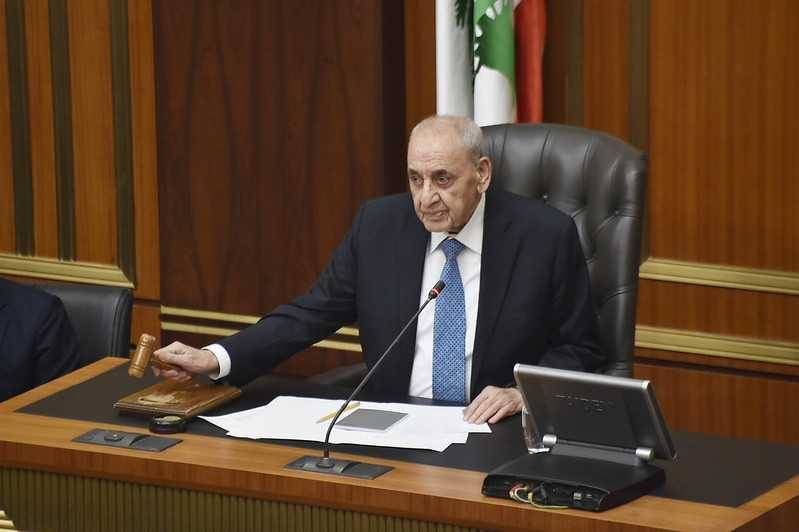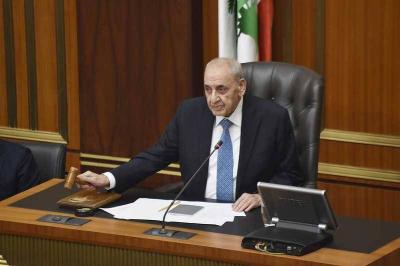The Lebanese Parliament stands less than two weeks away from the end of May 2024, the deadline set by the ambassadors of the quintet for electing a president, following more than 17 months of vacancy in the presidency without any signs of a breakthrough that encourages optimism about the political conditions becoming suitable to move the presidential election out of its deadlock. Although the quintet ambassadors—American Lisa Johnson, Saudi Walid Bukhari, French Hervé Magro, Egyptian Alaa Moussa, and Qatari Abdulrahman bin Saud Al Thani—have decided to transition from attempting to reconcile viewpoints among parliamentary blocs to encouraging and stimulating them to complete the presidential election based on the roadmap they have set, they recommended calling the parliamentary blocs for consultations to end the political stalemate, provided they are limited in scope and duration, aiming to define an agreed-upon candidate or a short list of candidates, after which the deputies would move to an open election session with multiple rounds.
This call from the quintet ambassadors received positive responses, led by Speaker Nabih Berri, who told "Asharq Al-Awsat" that the quintet has adopted his position, which he has been advocating for over a year and a half, calling for dialogue and consultations without preconditions, hoping to reach a consensus to exit the presidential elections from the deadlock. He confirmed the necessity of holding consecutive election sessions, suggesting that each session should consist of 4 or 5 rounds, and if electing a president proves impossible, they should call for a session after 24 hours, and so on, until the deputies manage to elect one.
Speaker Berri emphasized that he supports holding multiple sessions until a president is elected, stating: “I do not see any problem or obstacle on our part. The important question remains: Do they want dialogue or consultations? If they decide to participate in the dialogue, we will initiate the call to hold these sessions, and I hope that our invitation will receive the necessary response that opens the door for his election, as there is no interest for anyone in wasting time. The country can no longer bear a further decline into more crises and collapse amid the difficult conditions we are experiencing, which require us to unite our ranks to face the challenges and developments awaiting us in light of the continued Israeli aggression against Lebanon.”
President Berri revealed that the quintet ambassadors appear fully prepared to participate in efforts to achieve what their statement entailed. He mentioned that he would soon meet with the French ambassador as part of an agenda of meetings they have prepared, which includes distributing visits among the parliamentary blocs and independent deputies to save time. He confirmed that the purpose of their meeting with him is to evaluate the status of their communications so that we can build on what is necessary.
However, there remain questions needing answers: How will the opposition respond to President Berri's call to hold consecutive sessions with multiple rounds? Where does the quintet stand on his proposal in contrast to their suggestion of allowing deputies to proceed to an open electoral session with multiple rounds? What did the French ambassador bring to Lebanese Forces leader Samir Geagea? And did he return with an answer that could lead to a consensus on a compound formula regarding the presidential election that paves the way out of the stalemate? Who will oversee the consultations or dialogue, as merely participating with President Berri would, from the perspective of the Shia duo, imply that there is no competitor for him, and no grounds for reservations about his oversight?
Nonetheless, the limited time does not allow for the election of a president by the end of this month, as political sources point out, noting that the quintet’s ambassadors have prepared a roadmap to achieve this, even as they seek to urge the deputies to come together to stop the obstruction of the electoral process, in anticipation of potential developments that require a president to secure Lebanon's seat if a reevaluation of the roadmap in the Middle East is considered, paving the way for a new settlement. However, limited time is not the only barrier delaying the election, as political sources for "Asharq Al-Awsat" highlight, but rather a series of questions that require answers, even if the quintet ambassadors' statement implicitly contains a warning to the deputies, which is closer to an ultimatum, to hold them responsible for obstructing the election of a president.
Leading among these questions is whether international and regional conditions have become ripe for electing a president, who, as a quintet ambassador told "Asharq Al-Awsat," is expected to be the result of regional arrangements that have not yet come to fruition. Furthermore, what about Hezbollah, which repeatedly reiterates through its Secretary-General Hassan Nasrallah, its position saying to those concerned: There is no conversation with us before a ceasefire in Gaza? Is it prepared to reconsider its stance to reach a consensus, working with President Berri, to ensure that the presidential election requires engaging with the opposition halfway to agree on a president who stands equidistant from everyone, possessing the qualities that the "quintet" previously defined?
Thus, did the quintet ambassadors aim to corner the parliamentary blocs and hold them responsible for extending the presidential vacuum, or do they have external information that hastens the election of a president, necessitating them to rev up their engines to put an end to the delay in electing it?




